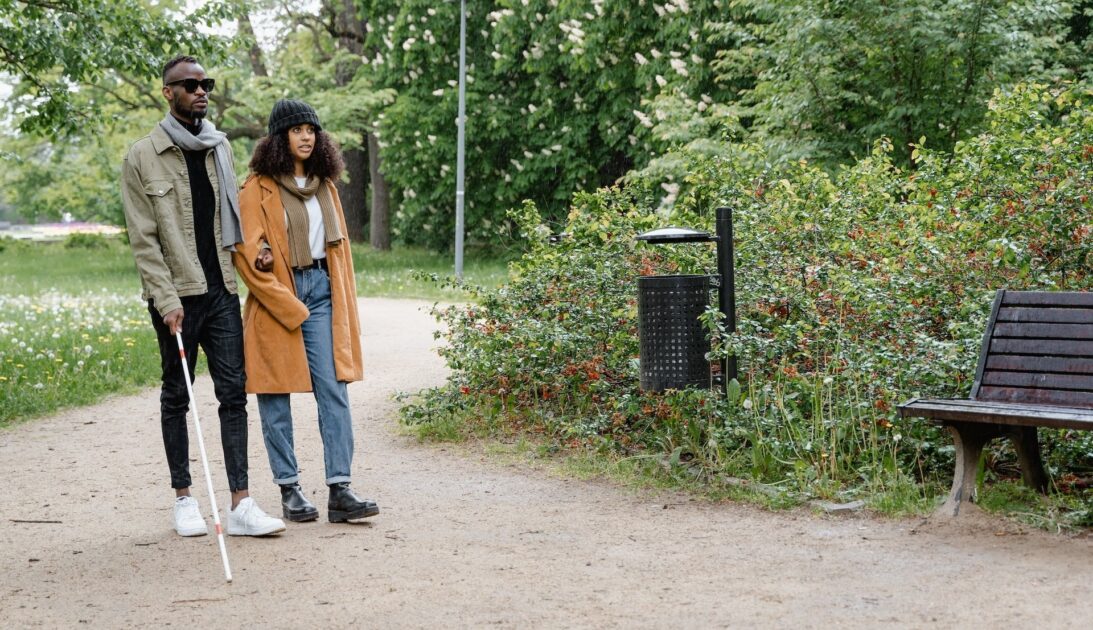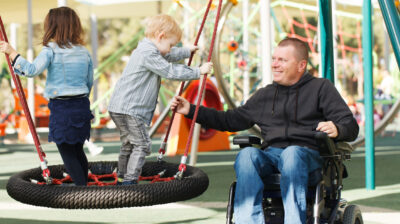How you can support a blind person
Computer science student and guide dog owner Paul shares his advice on how to help a blind or vision impaired person.

As a blind person, I have achieved many things some thought impossible. I am studying Computer Science and I am trained in the martial art of Judo.
I am also a guide dog owner living in Dublin. My experiences have taught me many things that I would like to share with you. I hope my advice can help you understand what it’s like to be blind and how you can support a blind person.
What it’s like being blind
First of all, being blind is not just seeing nothing. For some of us, this is the case. However, there is a lot of variation from the general perception of literally seeing nothing to having some vision, but it being non-functional as I like to call it.
To me, being blind or vision impaired is just not being able to actually use your vision if you have any. This obviously means that things are very different for us. For example, I am sitting at my computer writing this without reading the screen or looking at the keyboard.
How blind people do things differently
So how did I write this article? Well, for starters, on every keyboard on the F and J keys there are little bumps that I use to find the other keys on the keyboard. Alongside this, I use a piece of software called a screen reader, which is available on any kind of computer, phone, tablet and even some TVs. A screen reader basically turns any text or image into speech so that we can know what’s on the screen.
How do we get around the place? I’m sure you have seen people with “long white sticks” or dogs with harnesses on, but people usually don’t know how they work. The long white stick that you will see us use to navigate is actually called a cane. A cane works by either being rolled side to side to find obstacles or curbs in front of the blind person or by tapping side to side.
Guide Dogs also don’t just bring you wherever you want to go. You need to teach them how to get there, and even when you have you still have to give them instructions like stop and go or left and right.
There are actually a lot of little things that have been included around the world just for us:
- Those little bumps on the ground at traffic lights are actually there to let us know where we can cross.
- The reason traffic lights beep faster when the light is green is to let us know when we can cross, and the little part with the arrow actually vibrates too.
- Things like lift buttons, tablet boxes, signs on buildings and the stop buttons on buses all have Braille on them.
- A lot of movies and popular shows actually have versions where someone will describe to you what is happening, this is called audio description.
Some challenges we face
The first thing that may not jump to people’s minds when they hear about blindness is mental health. However, this can be a huge part of being blind for some people. So, it’s not the same for everyone, but for people who aren’t born blind and who go blind, it’s like losing a part of yourself. Whereas if you were born blind, then you don’t lose your vision, but you may wish you had it. Obviously, this experience is different for everyone, but it’s something not a lot of people think about.
A lot of challenges can vary depending on where you live however, I can say from living in Dublin, that independence can be a big issue for some people. Things like finding the type of milk you like in a shop or matching your clothes. There are solutions to a lot of these problems, but they aren’t all straightforward, like cooking for yourself or in my case, getting to my college campus.
While learning to get to college, there’s a lot of different things to consider like how do I get to the bus stop, is this the bus I’m meant to get on, there’s a construction site where I usually walk, or the traffic light isn’t making noise when I should cross.
One of the other main issues we face is discrimination. This can come in many forms: from someone who will treat you like a child just because you’re blind to getting refused a job that you could do perfectly fine. This is also something that can vary wildly and one of the things I have experienced is that people assume that I am not blind just because I don’t look blind.
There are many other examples of this, but this can have a huge effect on anyone with a disability. They may not want to go outside or may stop interacting with others because they are afraid of being treated differently.
Some advice
There are a couple of things that I want to mention for people who are going blind and people who aren’t blind. No matter what, please do not just grab a blind person’s arm and start walking them somewhere. It’s very important that we know where we are so we may get frightened or upset. If you do want to help us, then just ask and we will grab onto your upper arm so that you can lead us.
Don’t be afraid to approach us and ask a question or if we are struggling. Ask us if we need help. Some blind people do not like this, however, if they are struggling most people would love someone’s help.
If you are currently going blind, then don’t worry, there is a lot of support out there from organisations like the NCBI and Vision Sports who would love to help.
There are also apps like Be My Eyes which will connect you to a volunteer who will help you get around, find something or whatever else you might need.






